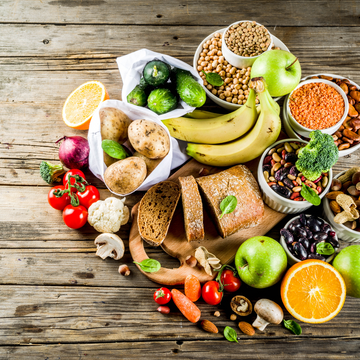The Importance of a Fiber-rich Diet for Gut Health
by Namita S on Feb 10, 2024

Among the many nutrients that contribute to overall well-being, fiber stands out as a crucial component, particularly for the health of our gut microbiome. Fiber is a type of carbohydrate found in plant-based foods that our bodies cannot digest. Unlike other nutrients, fiber passes through the digestive system relatively intact, providing a range of benefits along the way.
The Role of Fiber in Gut Health
Think of fiber as the fuel that powers our gut microbiome. While we may not derive energy from fiber directly, our gut microbes certainly do. Fiber acts as a prebiotic, serving as nourishment for the beneficial bacteria residing in our intestines. These microbes ferment fiber, breaking it down into short-chain fatty acids (SCFAs) such as acetate, propionate, and butyrate.
Benefits of Short-Chain Fatty Acids (SCFAs)
SCFAs produced through fiber fermentation play a crucial role in maintaining gut health and supporting overall well-being. Here's how:
Nourishing Gut Cells: SCFAs serve as a vital energy source for the cells lining the intestine, helping to maintain gut integrity and function.
Regulating Immune Function: SCFAs have anti-inflammatory properties and help regulate immune responses in the gut, reducing the risk of inflammation-related conditions.
Supporting Weight Management: Some research suggests that SCFAs may play a role in regulating appetite and metabolism, potentially aiding in weight management.
Improving Digestive Health: Fiber-rich diets can help prevent constipation by promoting regular bowel movements and supporting a healthy balance of gut microbes.
Sources of Fiber
So, where can we find fiber in our diets? Here are some excellent sources of dietary fiber:
Fruits and Vegetables: Berries, apples, bananas, broccoli, carrots, and leafy greens are all rich in fiber.
Whole Grains: Opt for whole grain bread, brown rice, quinoa, oats, and barley to increase your fiber intake.
Legumes: Beans, lentils, chickpeas, and peas are excellent sources of fiber and plant-based protein.
Nuts and Seeds: Almonds, chia seeds, flaxseeds, and pumpkin seeds are packed with fiber and other nutrients.
Fiber is a dietary superhero that plays a vital role in supporting a healthy gut microbiome and overall well-being. By incorporating fiber-rich foods into your diet and making simple lifestyle adjustments, you can nourish your gut microbes and reap the benefits of improved digestive health. Remember, a happy gut is important for overall health and wellbeing!


